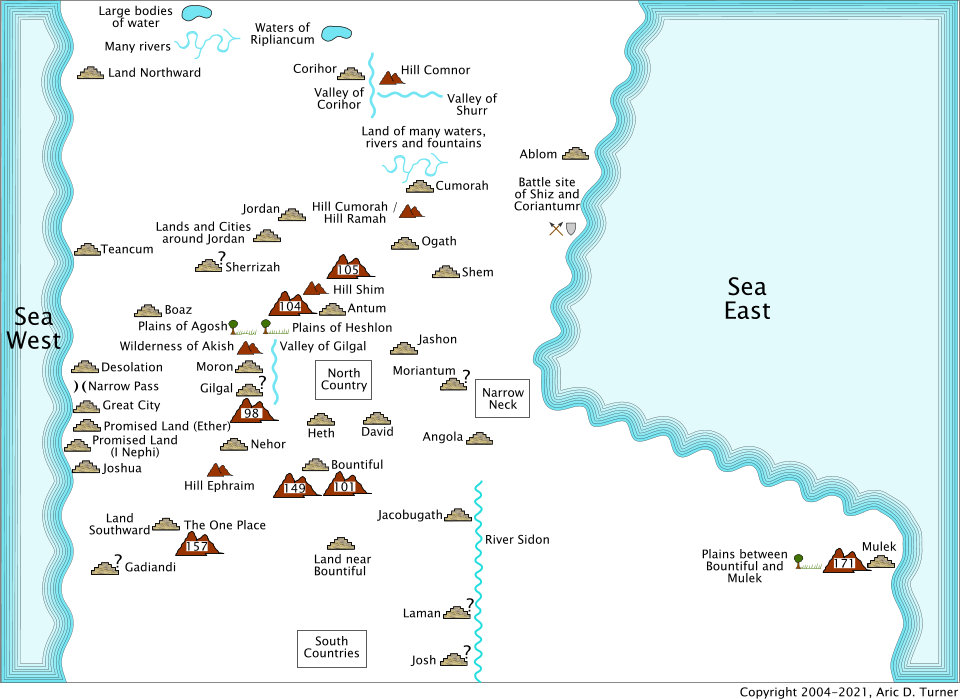Although Ablom is not referred to as a land, it is a place named Ablom that had a city. All other references to a 'place' in the Book of Mormon (except for Ogath) are synonymous with a land. By convention, the Nephites have a city of the same name as the name of the land. The land and city of Ablom are eastward from the hill Ramah/hill Cumorah and on the Sea East shore. There is a ridge between the land of Ablom and the land Nehor. The battle site of Shiz and Coriantumr by the Sea East shore is in the general proximity to the land of Ablom.
Commentaries (
view it on a map)
ETHER 4:4 [9:3]: And came over by the place where the Nephites were destroyed, and from thence eastward, and came to a place which was called Ablom, by the sea-shore, and there he pitched his tent, and also his sons and his daughters, and all his household, save it were Jared and his family.
Commentary: This verse references the places of the land of Ablom, hill Cumorah, hill Ramah, hill Shim, ridge between hill Shim and hill Cumorah, and the Sea East. 'He' refers to Omer. The phrase 'where the Nephites were destroyed' means the hill Cumorah. From Ether 6:83 [15:11], the hill Ramah is the same as the hill Cumorah. The term 'thence' indicates Ablom is outside the area around hill Cumorah. Traveling eastward to the sea indicates that Ablom is eastward from hill Ramah/hill Cumorah and on the Sea East shore. The phrase 'came over' means they traveled over elevated terrain from the hill Shim to get to the hill Cumorah. So, there is a ridge between the hill Shim and the hill Ramah/hill Cumorah. Hill Shim is south of the hill Ramah/Cumorah since they were traveling north when they passed the hill Shim and then turned east at the hill Ramah/Cumorah.
ETHER 4:10 [9:9]: And it came to pass that Nimrah gathered together a small number of men, and fled out of the land, and came over and dwelt with Omer.
Commentary: This verse references the places of the Ablom, Nehor, and a ridge between Ablom and Nehor. Omer was in Ablom at this time. The phrase 'fled out of the land' means Nimrah left the land of Nehor and came over to Ablom where Omer was at the time. The phrase 'came over' means they came over a ridge or elevated terrain between the land of Nehor and Ablom. Earlier travel from the land of Nehor to the land of Ablom puts the land of Nehor southward of the land of Ablom.
ETHER 4:11 [9:10]: And it came to pass that Akish begat other sons, and they won the hearts of the people, notwithstanding they had sworn unto him to do all manner of iniquity, according to that which he desired.
Commentary: This verse references the place of the land of Ablom. Akish is in Ablom at this time. To begat more than one son means that he stayed there for several years. The phrase, 'won the hearts of the people,' indicates that there were other people where Akish was. Many people in one place for several years would constitute a city. From Ether 4:4 [9:3], the phrase, 'place which was called Ablom,' would refer to either the city of Ablom or the land of Ablom. By stated practice, Ablom may also adhere to the practice of a land having a central city of the same name.
ETHER 6:62 [14:26]: And it came to pass that Shiz did pursue Coriantumr eastward, even to the borders of the sea-shore, and there he gave battle unto Shiz for the space of three days,
Commentary: This verse references the places of Ablom, the battle site of Shiz and Coriantumr by the Sea East shore, plains of Agosh, and the Sea East. The pursuit was eastward from the plains of Agosh. The seashore is east of everything, which means the Sea East. Based on the directions of the pursuit, the location of the battle should be in the general proximity to the land of Ablom. There is no name given for this location so I gave it the name of the battle site of Shiz and Coriantumr by the Sea East shore.
Map


